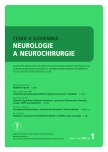Myastenia with Positive Anti-MuSk-positive Antibodies in a Young Man: A Case Report
Authors:
E. Ehler; J. Latta
Authors‘ workplace:
Neurologické oddělení, Krajská nemocnice Pardubice
Published in:
Cesk Slov Neurol N 2008; 71/104(1): 101-104
Category:
Case Report
Overview
Transient diplopia, dysarthria, dysphagia and dysphonia occured in a 21-year muscular man after a mild viral infection. Repetitive stimulation with mild decrement, non-improvement after pyridostigmin and absence of anti-ACHR antibodies gave evidence against neuromuscular transmission disorder. On the contrary signal hyperintensities on brain MRI created the basis for a long follow-up in a neurological outpatient department under the diagnosis brainstem symptomatology probably inflammatory origin. During the following years many attacs of dysarthria, nasolalia and dysphonia occured with only one and last attack of dyspnea. Because of these complaints the patient was newly recommended to neurological department. We made a new evaluation of complaints and clinical finding, EMG studies and at last blood samples for anti-MuSK antibodies were taken. Clinical findings and auxilliary investigations were typical for myasthenie with anti-MuSK antibodies. Clinical findings, comparison with anti-ACHR positive myasthenia, EMG findings and pharmacotherapy are objects of discussion.
Key words:
myasthenia – muscle specific kinase – anti-MuSK antibodies – repetitive stimulation – SF-EMG
Sources
1. Evoli A, Tonali PA, Padua L, Lo Monaco M, Scuderi F, Batocchi APOD. Clinical correlates with anti-MuSK antibodies in generalized seronegative myasthenia gravis. Brain 2003; 126 : 2304-2311.
2. Farrugia ME, Kennett RP, Newsom-Davis J, Hilton-Jones D, Vincent A. Single-fiber electromyography in limb and facial muscles in muscle-specific kinase antibody and acetylcholine receptor antibody myasthenia gravis. Muscle Nerve 2006; 33 : 568-570.
3. Piťha J, Ambler Z. Nejčastější chyby a omyly v diagnostice a terapii myasthenia gravis. Neurol pro praxi 2004; 5 : 285-290.
4. Keller O. Myastenie gravis. Trendy v medicíně 2000; 2 : 35-40.
5. Vincent A, Leite MI. Neuromuscular junction autoimmune disease: muscle specific kinase antibodies and treatments for myasthenia gravis. Curr Opin Neurol 2005; 18 : 519-525.
6. Shiraishi H, Motomura M, Yoshimura T, Fukudome T, Fukuda T. Acetylcholine receptors loss and postsynaptic damage in MuSK antibody-positive myasthenia gravis. Ann Neurol 2005; 57 : 289-293.
7. Sanders DB. MuSK-antibody positive myasthenia gravis: clinical and electrodiagnostic findings. In: Trontelj JV (Ed). XVIth international SFEMG and QEMG Course and IXth quantitative EMG conference. Program and Proceedings. Ljubljana 2007 : 119-123.
8. Jaretzki A, Barohn RJ, Ernstoff RM, Kaminski HJ, Keesey JC, Penn AS, Sanders DB. Myasthenia bravis. Recommendations for clinical research standards. Neurology 2000; 55 : 16-23.
9. Sanders DB, El-Salem K, Massey JM, McConville J, Vincent A. Clinical aspects of MuSK antibody positive seronegative MG. Neurology 2003; 60 : 1978-1980.
10. Caress JB, Christopher HH, Batish SD. Anti-MuSK myasthenia gravis presenting with purely ocular findings. Arch Neurol 2005; 62 : 1002-1003.
11. Oh SJ, Hatanaka Y, Hemmi S, Young AM, Scheufele ML, Nations SP. Repetitive nerve stimulation of facial muscles in MuSK antibody-positive myathenia gravis. Muscle Nerve 2006; 33 : 500-504.
12. Leite MI, Ströbel P, Jones M, Micklem K, Moritz R. Fewer thymic changes in MuSK antibody-positive than in MuSK antibody-negative MG. Ann Neurol 2005; 57 : 444-448.
Labels
Paediatric neurology Neurosurgery NeurologyArticle was published in
Czech and Slovak Neurology and Neurosurgery

2008 Issue 1
-
All articles in this issue
- Clinical use of antibodies in multiple sclerosis
- Idiopathic generalised epilepsies with typical absences in adults
- Diffuse brainstem gliomas in children. A nightmare for a paediatric oncologist.
- Safety of MRI in patients with metal implants and implanted devices
- Microscopic detection of Cryptococcus in the cerebrospinal fluid as the first symptom of the advanced stage of AIDS – a case study
- Myastenia with Positive Anti-MuSk-positive Antibodies in a Young Man: A Case Report
- Myasthenia gravis
- The Impact of L-DOPA and Entacapon Therapy on Plasma Level of Homocysteine in Parkinson’s Disease Patients
- The Effect of Low Doses of Mannitol on Serum Osmolality
- Mechanical embolectomy by means of the Merci retriever in patients with acute occlusion of brain arteries
- Carotid Endarterectomy and Carotid Angioplasty Stenting as Complementary Treatment Methods: Three Years Experience
- Agenesis of the lateral semicircular canal: a case study
- Optic neuritis caused by mucocele of paranasal sinuses – a casual link or a coincidence? A case study
- A case of multifocal steroid-responsive encephalitis as a cause of intractable frontal lobe seizures
- Czech and Slovak Neurology and Neurosurgery
- Journal archive
- Current issue
- About the journal
Most read in this issue
- Safety of MRI in patients with metal implants and implanted devices
- Diffuse brainstem gliomas in children. A nightmare for a paediatric oncologist.
- Myasthenia gravis
- Clinical use of antibodies in multiple sclerosis
